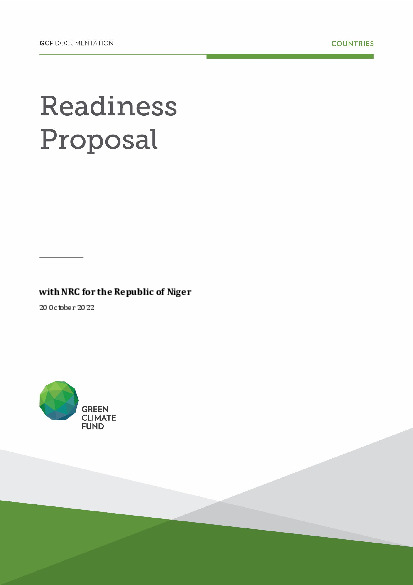Expert support to strengthen Niger’s operational capacity for accelerated and sustained access to climate financing

Expert support to strengthen Niger’s operational capacity for accelerated and sustained access to climate financing
Climate change is a global threat, but its impact is not being felt equally. Least Developed Countries (LDCs) are the most impacted and the least able to afford its consequences. Niger, a semi-arid and LDC is exposed to climate risks associated with its position as a Sahelian landlocked West African country. Climate variability and change are compounded by the country’s high dependence on rainfed agriculture, livestock, and its natural resources to support food security and livelihoods, and chronic humanitarian crises due to recurrent drought, flooding, and food insecurity (more than 80% of the population directly depend on the exploitation of natural resources). Changing weather patterns are leading to losses in crop production and unquantifiable human impact caused by disease, migration, unemployment, and loss of wealth. Niger is facing the greatest impacts - it is ranked 173 out of 181 in the ND-GAIN1 index of vulnerability to climate change and readiness to improve resilience.
To cope with climate change challenges and risks, the Government has set up a policy and operational framework that includes institutional arrangements, strategies, and programmes. Efforts are also made to expand the scope of climate finance opportunities to meet country’s objectives in the area of climate change: accreditation of Banque Agricole du Niger (BAGRI) to the Adaptation Fund and its nomination by the NDA for accreditation to GCF; formulation of a private sector resource mobilization strategy; setting up of a cross-functional coordination body for environmental (CNEDD) and a GCF technical committee responsible for GCF project portfolio preparation. However, significant barriers need to be addressed to operationalize the country’s programming and strategies, by attracting, making coherent and sustaining financing for climate actions. Barriers are specifically related to:
- Limited in-house resources of BAGRI to lead and coordinate the GCF accreditation process, and therefore support government effort to extend the scope of funding opportunities.
- Poor involvement of the private sector in the climate change and agriculture landscapes, all along the planning and implementation of policies and programming; and
- Absence of a regular communication/dialogue mechanism between NDA and partners, including GCF-accredited entities, to fostering the exchange on common challenges and solutions on climate finance in a long run.
This proposed readiness project is thus intended to contribute to overcoming barriers which hinder Niger’s operational capacity for accelerated and sustained access to climate financing, by:
- uplifting capabilities of BAGRI, already endorsed by the NDA to accreditation, to meet the GCF’s accreditation standards,
- Enhancing private sector engagement on climate change and agriculture, in particular by providing space for public-private dialogue on constraints and opportunities in pursuing business opportunities for adaptation and mitigation products and services; and
- fostering and engaging the NDA and its partners to effectively fulfil their roles and responsibilities regarding the Fund in a transparent and participatory manner, through the establishment of a dialogue mechanism including appropriate knowledge sharing tools, in support to the co-production of climate finance solutions, and optimization of climate funding.
The project’s main beneficiaries are the NDA, the Banque Agricole du Niger (BAGRI), sectoral ministries which are part of the National Technical Commission on Climate Change and Variability (CTNCVC) (hydro met, planning, agriculture, water resources, energy, health), private sector including private advisory support services (SPAC), local financial sector representatives (regulators, banking and non-banking institutions), community-based organizations (CBOs), and civil society organizations.